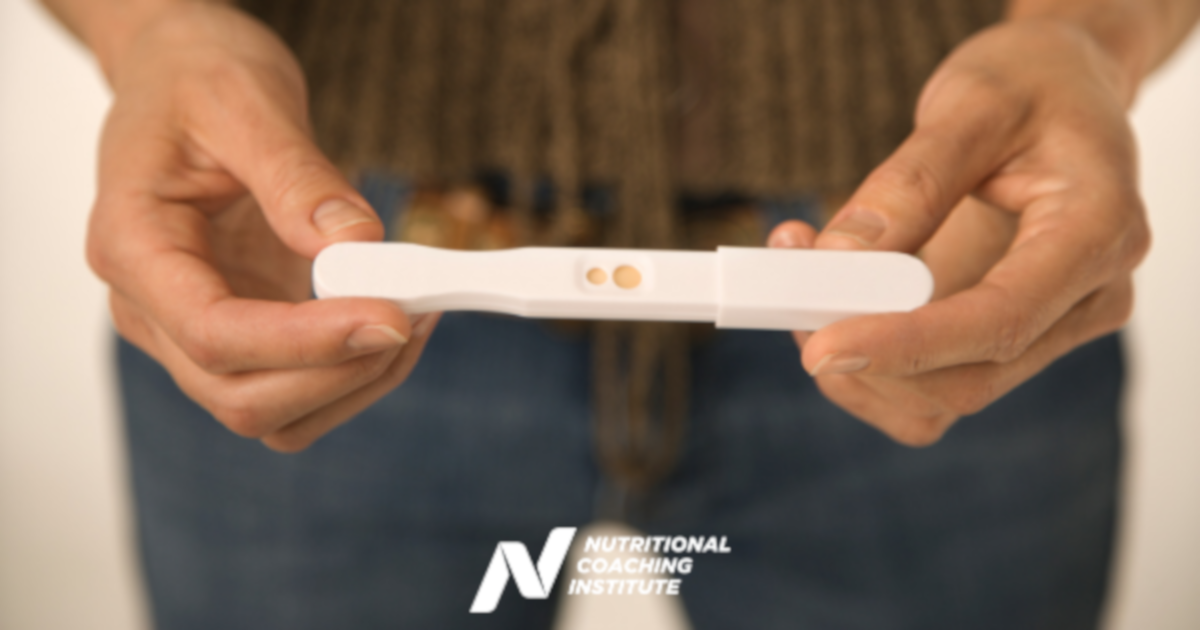In regards to prenatal nutrition, a large amount of focus is placed on proper dietary intake and supplemental recommendations throughout the 3 trimesters of pregnancy, as well as what many consider the 4thtrimester (the 3 months following birth). However, often overlooked or minimized, is the preconception period- the phase leading up to fertilization and implantation.
The reason this period is so important is due to the fact that not only do mothers and infants have a lower risk for health concerns if the mother is healthy prior to conception, but also because many of baby’s critical developments may be made before the mother even knows she has conceived.
Nutrition coaches who work with female clients of child-bearing age, who may be interested in starting a family, should be comfortable having conversations with their clients about appropriate nutritional recommendations. Therefore, several things should be considered in coaching clients through the preconception period, including nutrient deficiencies and fetal development.
Nutrient Deficiencies: Fertility and Healthy Fetal Development
Fertility can be impacted by nutrient deficiencies, as well as gut health, improper diet, and hormonal imbalances. As nutrition coaches, we are not in the business of diagnosing infertility or stepping outside of our scope of practice. However, clients can be encouraged to prioritize a well-balanced diet based on their current weight, training volume, and dietary history, as well as increasing intake of micronutrients that may be of benefit to their overall goal of conceiving.
Undereating, overtraining, obesity, environmental and dietary sources of estrogen, and an over-stressed body can contribute to hormone imbalances. However, it’s important to note that certain vitamin deficiencies (especially vitamins C, E, and calcium) can also lead to hormonal shifts, and thus create a negative effect on a client’s chances of getting pregnant. (Osborne, 2008).
On top of the impact deficiencies can have on fertility, deficiencies in key micronutrients (including choline and B Vitamins, and Omega 3 fatty acids) may also have a large impact on baby’s overall health and development during the early days of conception. Therefore, reducing the risk of nutrient deficiencies should remain a top priority throughout the preconception period. This can be done by highlighting nutrient-dense foods and reducing intake of excess sugar, processed foods, and under or over consumption of calories.
Foods rich in a wide array of vitamins and minerals should be prioritized, specifically those high in choline, B Vitamins (especially folate), and Omega 3 fatty acids. To help, the following should be encouraged:
- Foods rich in choline, such as eggs, liver, and cruciferous vegetables. Choline is vital for fetal cognitive development, memory, and placental function. Majority of women are deficient in choline (even those who supplement with a prenatal vitamin), but women who eat eggs have double the intake of choline compared to those who do not. (Nicols, 2018).
- Foods rich in folate, such as liver and leafy greens. Folate is a B vitamin that helps prevent birth defects. It should be noted that majority of the population (up to 60%) may not be able to use synthetic folic acid due to a genetic variation that limits the body’s ability to convert folic acid to folate. Therefore, prenatal vitamins should have folate, not folic acid. (Nicols, 2018).
- Foods rich in other B vitamins (especially B6 and B12), such as slow-cooked meat, meat on the bone, bone broth, liver, and leafy greens. B vitamin deficiency can increase the risk of miscarriage, preterm labor and birth defects. Sufficient levels of B Vitamins are also important postpartum for breastfeeding mothers. (Nicols, 2018).
- Foods rich in Omega 3 fatty acids, such as salmon, fatty fish, and pasture-raised eggs. Foods high in DHA, a brain-boosting fatty acid, is imperative for brain and eye development, and levels should remain high for breastfeeding mothers. Plant-based sources such as flax and chia seeds do contain ALA (which is converted to DHA) but the conversion process is often slow and can’t keep up with baby’s needs. Therefore, seafood-based sources are recommend first, and plant-based sources can still be part of a healthy diet. Also important to consider is ensuring consumption of Omega 6 fatty acids does not create an imbalanced ratio of Omega 3 fatty acids. The ideal ratio is 1:1. (Nicols, 2018).
- Prenatal vitamins and other supplements such as Vitamin D, Vitamin B complex and magnesium can also be recommended to help with overall micronutrient intake. All suggested supplements can and should be discussed with the client’s medical practitioner.
Development of the Fetal Nervous System
Not only are appropriate levels of micronutrients important throughout pregnancy to help with fetal growth, but it’s important to note that the development of the fetal nervous system begins in the 3rdweek of gestation and extends for a period postnatally. (Stiles and Jernigan 2010). Considering many women find out they’re pregnant no earlier than their 4thweek of gestation (and many much later than that), the fetus may be exposed to toxins in those early stages, without the mother intending to do harm. Therefore, these factors must be considered prior to a client getting a positive pregnancy test.
The following should be eliminated for women attempting to conceive:
- Alcohol
- Cigarettes
- Illegal Substances
The following should be reduced or eaten in moderation for women attempting to conceive:
- Foods high in sugar or refined carbs (especially if consumption of these food choices take priority over more nutrient-dense foods, such as vegetables).
- Excessive Caffeine or other stimulates
- Vegetable Oils
- Soy
*All prescribed or recommended medications and supplements should be reviewed by the client’s medical practitioner.
Navigating the preconception period can seem simple – a woman has yet to conceive and can continue to make her normal choices without fear of impacting her future child. However, nutrient deficiencies and intake of harmful substances can impact a woman’s fertility and the environment in which her future fetus will grow and develop.
Studies also continue to emerge signifying that a mother’s lifestyle choices can impact her baby’s long-term health. (Gardiner, Nelson, Shelhaas, Dunlap, Long, Andrist, Jack, 2008). Therefore, coaches should begin early assessments of clients who are interested in conceiving, ensure that dietary intake is well-rounded and nutrient dense, and all concerning foods and substances have been reduced or eliminated.
References:
Gardiner, Paula M, Nelson, Laura, Shelhaas, Cynthia, Dunlop, Anne, Long, Richard, Andrist, Sara, Jack, Brian. “The clinical content of preconception care: nutrition and dietary supplements.” American Journal of Obstetrics and Gynocology 199.6 (2008): 345-352. AJOG. Web. 15 Aug. 2018.
Nicols, L. M. (2018). Real Food for Pregnancy. Middletown, DE: Nichols.
Osborne, Peter. (2008). “Infertility and Micronutrient Deficiencies.”Retrieved from https://cdn2.hubspot.net/hub/81015/file-15729508-pdf/docs/333_infertility_handout_01.09.pdf
Stiles, Joan and Jernigan, Terry. “The Basics of Brain Development.” Neuropsychology Review 20.4 (2010): 328. NCBI.Web. 15, Aug. 2018.





